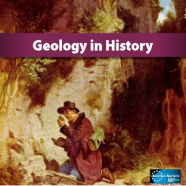GEOLOGY IN HISTORY
PRESS RELEASE
“GEOLOGY IN HISTORY”
The geologist: an unknown actor in many historical events
The latest EuroGeoSurveys publication “Geology in History” will be launched on 28th March 2017 at the OREGA Brussels Leopold, during the EuroGeoSurveys 42nd General Meeting by Mr. Patrick McKeever, Secretary of the International Geoscience Porgramne at UNESCO, Mr. Gwen Cozigou, Director of the European Commission’s DG for Internal market, Industry, Entrepreneurship and SMEs, and Ms. Charlina Vitcheva, Deputy Director General of the European Commission’s DG Joint Research Centre.
The book describes a surprising and unusual combination that brings you to understand how the geological discoveries have marked history and determined the shape of our society, of our culture and of our habits. The European Geological Surveys are pleased to present some examples highlighting the links between History and geology. Most of them are related to mineral resources which constitute the basement of the development of mankind. In some cases, geology has been at the heart of numerous battles, such as in Italy, where a volcanic island was fought over among three different empires: the British, French and Italians who have tried to obtain its ownership but a geological process quickly solved the political problem; Ferdinandea was eroded by the sea and disappeared. The geology has marked a new turn during the First World War. In the face of new and incredible firepower, many front lines are frozen and it is then necessary to use underground space, requiring geological knowledge. Water was required in considerable volume to supply troops. Armies also had to protect their own side and attack the enemy from the ground. Warring parties also needed mineral resources to sustain the war industry, mainly coal and iron, but also a large amount of metals: nickel, aluminium, copper. To find these strategic raw materials, numerous geologists were involved. From a more peaceful point of view, geologists have solved several problems such as the access to drinking water in Austria. They have implemented scientifically based ideas within political and environmental practices, such as in Austria where Eduard Suess, in the 19th century, introduced from the Romans the concept of clean drinking water for urban areas being brought from far-away. He built the First Vienna Mountain Spring Pipeline in order to decrease the number of deaths from typhus, to support the shipping business and to eliminate the danger of flooding.
Through “Geology in History” EuroGeoSurveys renewed its commitments in engaging with the wider public to communicate geology by showing how human beings would not have evolved without geologists and geology.
The launch event will be attended by the Directors of the Geological Surveys of Europe, EU representatives and invited guests from America, Asia and Africa. The event, broadcasted in live-streaming, will be also an occasion to open the debate that will be held the day after during the EuroGeoSurvey’s Directors Workshop “Geology in History” .
BACKGROUND
EuroGeoSurveys (EGS), The Geological Surveys of Europe, is a not-for-profit organisation representing 37 National Geological Surveys and some regional Surveys in Europe, an overall workforce of several thousand experts.
Links http://www.eurogeosurveys.org
Contacts EuroGeoSurveys Secretariat
36-38, Rue Joseph II- 1000 Brussels, Belgium | Tel +32 2 888 75 53
Ms Claudia Delfini claudia.delfini@eurogeosurveys.org
Ms Francesca Siciliano francesca.siciliano@eurogeosurveys.org


